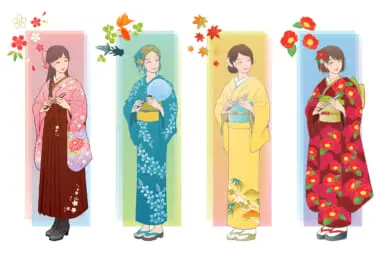by Sheridan Pressey
More aware than anyone else of the pleasures and frustrations experienced by foreigners living in Japan are the foreign women who have married Japanese men and settled here. Their situation is unique by circumstance as well as choice. Just as they were not born into the lifestyle and culture of the Japanese and find some difficulty adapting to it, neither are they wholly in tune with their own transplanted foreign cultures – represented by members of the diplomatic corps and foreign business community.
The women form their own community, separate and distinct, though only recently have any of them attempted to get together a foreign wives’ club (as yet unnamed) for mutual benefit.
We were curious as to how these women were coping with married life in Japan, no doubt complicated by having two cultures integrated into daily living instead of just one. We therefore sought out a number of postwar brides and threw out a few, we hope hot impertinent, questions.
Almost without exception, the women, of whom a large number come from the United States and Germany, met their husbands in their own countries, where the men were students or, occasionally, employes of Japanese companies.
Invariably, the wives broke up in laughter when the question was idly posed. Was there something specially attractive about Japanese men that led them to marry one? The mutual attraction was obviously there, and the couples found many things in common; nationality and race were just not factors which made much difference, they concurred.
Before their marriage many of these women had held positions in schools as foreign student aides or in organizations such as EXIM Bank which put them in steady contact with foreign visitors. Often, they and their future husbands met at universities where they were both pursuing advanced degrees in physics, medicine, political science.
Any supposed culture gap between East and West had not been apparent enough in their persons to interfere in their relationship, said the wives. The period of stay in foreign countries for most of the men was approximately three years, and during that time they shed many of their Japanese customs and attitudes for those of the West.
For many of the women, contact with Japan before marriage had been only peripheral. Usually, they were married in the country of the bride, who then accompanied her husband to Japan for the first time. The husbands had frequently tried to prepare their wives for what to expect. But, a number of the women reported that they underplayed or often were not aware themselves of the problems in adjusting permanently to family living a la japonaise.
In most cases, the marriages themselves were events to remember, occurring after heated arguments with one or both sets of parents. Small-town paranoia often dictated the adverse attitudes of American parents and neighbors.
Commented one young wife wryly, “Snippy old ladies used to come around my father’s restaurant inquiring if my husband was Christian.”
In other cases, where the girl was an only child, parents were reluctant to let their “child” go off to a strange land on the other side of the globe. Japanese parents were frequently distressed at losing only sons to gaijin women, particularly after promises had been exacted from their sons that they “would under no circumstances marry a foreigner.”
Long-lasting opposition was characteristic of parents living in the Japanese countryside, where tradition is stronger and contract with foreigners is less frequent. In one case, the older brother finally placated his father into accepting the prodigal son back into the family.
In the case of another couple, married two years, the father maintains that his “blood line has been spoiled” by his only son’s marriage and has still not recognized the union despite concessions by the husband.
One such concession, which the wife only recently learned of was a promise not to have any children for three years.
Where parents are living in Tokyo, New York or other large cities, however, family objections are almost nonexistent. Few parents have maintained a hard-nosed attitude for long. One newly-wed remarked with humor, “At first there were some misgivings, but now if there was a choice between my husband and me, my Japanese family would probably take me!”
Upon settling in Japan with their husbands, all of the foreign wives professed to experiencing profound culture shock where living standards were concerned. Most of them live in small Japanese-style homes or apartments frequently shared with their in-laws—which was expected.
The prohibitive rents they did not expect. By and large, their husbands are employed by Japanese companies and universities at preposterously low salaries, considering their skills and experience. The family is thus deprived of the amenities, like good schools for their children and maids, which are taken for granted abroad.
One attractive German woman married six years related how in 1966, her husband having secured a Ph.D. in astronomy at a German university, returned to Japan where he was to take up a top position at Tokyo University. They were aghast when he was allotted a salary of only ¥36,000 per month to support himself, his wife and a baby. For two years, she continued, the three of them lived on ¥14,000 per month, the rest going for rent. “I remember everywhere we were during those two years,” she lamented. “We were nowhere.”
Circumstances have not changed greatly since. She and many of the other wives are working, which their Japanese husbands encourage as one of the benefits of having a foreign wife. Remarked one wife, “I first started working at the suggestion of my husband. He said, ‘Work.’ And then I worked.”
The result often is that husbands and wives, though they can now afford a maid for their kids and house, rarely see each other OR the kids, hours being as long as they are at Japanese companies. One exasperated mother, caught in this predicament, has just transferred her daughter from a Japanese elementary school to the American School, not because the quality of education is any different but because the child no longer speaks English, seeing more of her maid than of her mother.
Socially, the foreign wives have encountered very little antiforeign sentiment or prejudice. They have, on the other hand, even those who speak Japanese, found it difficult to make close friends, attributing this as much to their own lack of understanding of Japanese etiquette as to the difficulty of Japanese in finding a place for foreigners in their culture.
The majority of wives, some of whom work with PTAs and local groups, have critical words for life in Japan is general—”slow and static,” “too couple-oriented” —and Tokyo in particular— “intellectually unsatisfying,” “socially irresponsible.” They explained that things like lack of parks for children, poor sanitation, salary and job inequities and irrational, laws are generally accept as fact, without question.
Despite these frustrations, many couples have discarded temporarily or permanently the idea of moving away from Japan, because of family obligations, professional demands or simply strong personal attachments to Japan. The foreign wives of Japanese men have found many things to appreciate in Japan and feel they themselves, in their unique position, can make a contribution, as well they can.
Studying Japanese culture is not living it, so try for a trip here before you decide to marry. Be open-minded, adaptable and willing to give up some comforts of home, they advise. If you want difficulties, you will have them; but if you want it good, you can have that, too.








